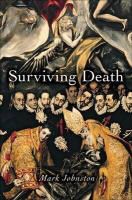Read more
Zusatztext "[ Surviving Death and Saving God ] constitute a remarkably thorough and convincing treatment of two extremely important religious issues, those of the perennial allurements of idolatry and the deeply menacing fact of death, to say nothing of the books' endorsement and defense of an arduous but richly inspiring ideal of the religious life. The books are a welcome corrective for some of the most seductive and prevalent distortions of religious thought and practice. I heartily recommend them to the reader who relishes a bountifully laid, religiously nourishing, and deeply satisfying philosophical feast." ---Donald A. Crosby, International Journal for Philosophy of Religion Informationen zum Autor Mark Johnston is the Walter Cerf Professor of Philosophy at Princeton University and the author of Saving God: Religion after Idolatry (Princeton). Zusammenfassung Why supernatural beliefs are at odds with a true understanding of the afterlife In this extraordinary book, Mark Johnston sets out a new understanding of personal identity and the self, thereby providing a purely naturalistic account of surviving death. Death threatens our sense of the importance of goodness. The threat can be met if there is, as Socrates said, "something in death that is better for the good than for the bad." Yet, as Johnston shows, all existing theological conceptions of the afterlife are either incoherent or at odds with the workings of nature. These supernaturalist pictures of the rewards for goodness also obscure a striking consilience between the philosophical study of the self and an account of goodness common to Judaism, Christianity, Hinduism, and Buddhism: the good person is one who has undergone a kind of death of the self and who lives a life transformed by entering imaginatively into the lives of others, anticipating their needs and true interests. As a caretaker of humanity who finds his or her own death comparatively unimportant, the good person can see through death. But this is not all. Johnston's closely argued claims that there is no persisting self and that our identities are in a particular way "Protean" imply that the good survive death. Given the future-directed concern that defines true goodness, the good quite literally live on in the onward rush of humankind. Every time a baby is born a good person acquires a new face. ...

